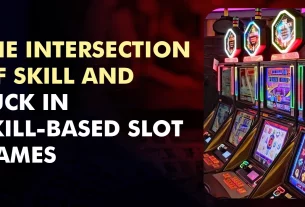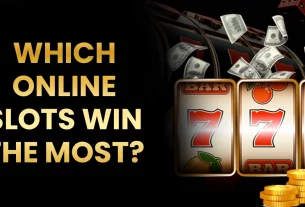The flashing lights, upbeat music, and spinning reels of a slots game are designed for one thing—continuous excitement. Whether you’re chasing a slots jackpot or enjoying a round of hold and win slots, it’s easy to lose track of time.
But ask any seasoned player or casino strategist, and they’ll tell you: knowing when to stop is as important as knowing how to play.
So how long should you play a slots game? The answer isn’t as simple as “until you win.” It depends on how you play, what you’re chasing, and how well you manage your bankroll and attention span.
Let’s dive into the psychology, math, and strategy behind timing your slot sessions for maximum enjoyment and minimum regret.
The Psychology of Time in Slot Play
Casino game designers know that time perception fades during high engagement. Slot machines—especially modern slots games—use constant motion, sound cues, and intermittent rewards to keep your brain stimulated.
Studies in gaming psychology show that when players are “in the zone,” they lose track of minutes and even hours. This is why self-awareness is key.
At Khelraja online casino, players can enjoy slots in moderation by tracking playtime and setting built-in session limits. The goal is to maintain excitement without drifting into autopilot mode, where time disappears and decisions get sloppy.
Rule of thumb: If you’ve been spinning for more than 45–60 minutes without a break, you’re likely no longer playing optimally.
Understanding Slot Mechanics and Payout Timing
A slots game doesn’t have a memory. Each spin is independent, powered by a Random Number Generator (RNG). That means playing longer doesn’t increase your chances of winning—it only increases the number of bets placed.
However, players often feel momentum after small wins or close calls, known as the “illusion of control.” This psychological pull can extend sessions unnecessarily.
Here’s how to think about payout timing:
- Short sessions (15–30 minutes): Great for casual play and bonus hunting.
- Medium sessions (30–60 minutes): Ideal for exploring a new slots game or testing volatility.
- Long sessions (1+ hour): Suitable for experienced players managing larger bankrolls.
There’s no magic number of spins that guarantees results—but understanding when the fun fades helps you step away with satisfaction.
The Role of RTP and Volatility in Session Planning
Every slots game comes with two key stats: RTP (Return to Player) and volatility. These numbers determine how your session feels over time.
- High RTP (96%+): Offers steady, smaller payouts that reward longer sessions.
- Low RTP: Best for short, high-risk bursts of play.
- High Volatility: Big jackpots but fewer wins—suitable for short or medium sessions.
- Low Volatility: Frequent small wins that support extended play.
Example: A player exploring hold and win slots may experience longer dry spells followed by intense bonus rounds. This format is perfect for 20–40 minute sessions with periodic breaks.
If you’re chasing real money earning games, always check the RTP before you start. It helps you estimate how much time (and bankroll) your play might realistically sustain.
5 Signs It’s Time to Stop a Slots Game Session
Unlike time on a watch, the emotional clock measures your engagement level. Here are five telltale signs it’s time to stop a slots game session:
- You’re no longer enjoying the spins. The game feels repetitive or frustrating.
- You start chasing losses. Increasing bets after a losing streak is a red flag.
- You’ve doubled your session goal. Celebrate, don’t press your luck.
- You lose track of time. If an hour feels like ten minutes, take a breather.
- You feel compelled to win “just one more.” That thought means you’re on tilt.
Set emotional as well as financial stop points. When one is reached, walk away—no matter what’s on the reels.
The Myth of “Hot” and “Cold” Slots
Many players believe in the idea of “hot” machines that are due for a win after long dry spells. The truth? RNG-based slots games don’t have memory.
Each spin is independent, so staying longer on a “cold” game won’t improve odds. Instead, it increases exposure. If your payout frequency drops or the thrill fades, switch to a different title or take a short break.
Platforms like Khelraja online casino offer hundreds of slots games—mixing themes, volatility levels, and bonus mechanics—so it’s better to diversify than to dig into one stubborn game.
How to Use Time Limits and Tools to Your Advantage
Responsible play is about structure. Modern online casinos make it easier to manage session length through:
- Session timers: Track active play automatically.
- Deposit and wager limits: Set spending caps that indirectly regulate time.
- Reality checks: Pop-up reminders that appear after a set duration.
At Khelraja online casino, you can combine these with manual routines—like setting a 30-minute phone timer or using the “spin limit” option on select titles.
Your goal: make time your ally, not your enemy.
Comparing Slots to Other Casino Games
When considering how long to play, it helps to understand how slots games differ from other formats:
| Game Type | Average Session | Skill Required | Emotional Risk | Recommended Play Style |
| Slots Game | 30–60 mins | Low | Medium–High | Play in bursts with breaks |
| Live Table Games | 60–90 mins | High | High | Strategic focus sessions |
| Game Shows | 20–40 mins | Low | Medium | Short, high-energy play |
| Lottery/Crash Games | 5–20 mins | Low | Medium | Quick, casual play |
Slots require less decision-making but more emotional awareness. The pace is rapid, so burnout sets in faster. Keep sessions short to sustain fun and focus.
Bankroll and Time: The Twin Pillars of Slot Strategy
Think of your bankroll and time as two halves of the same equation.
For example, if you have ₹2,000 to spend on a slots game and bet ₹50 per spin, your bankroll can handle roughly 40 spins. Depending on spin speed (3–4 seconds each), that’s about 2–3 minutes of play before bonuses or wins stretch it further.
If you plan a 30-minute session, lower your bet size to stretch playtime. At Khelraja online casino, bonus features and free spin offers also extend session value without added cost.
This balance of pacing and money management is what separates responsible players from impulsive ones.
The Benefits of Shorter Sessions
While long gaming sessions sound exciting, shorter bursts of play have distinct advantages:
- Improved focus: You make clearer decisions early in a session.
- Better win perception: Small wins feel more satisfying when you’re fresh.
- Healthier habits: Avoid fatigue and overexposure.
- Budget control: Harder to overspend in short sessions.
Most professional slots game streamers and analysts suggest 20–45 minute sessions followed by short breaks—an approach that aligns with both psychology and mathematics of sustained enjoyment.
Setting Personal Rules for Slot Play
Finally, create your personal play policy:
- Session limit: 45 minutes maximum.
- Win limit: Double your starting amount = stop and cash out.
- Loss limit: 50% of your budget = pause or stop.
- Break rule: 10 minutes off every hour.
Use these as flexible boundaries, not strict barriers. They help keep you grounded, focused, and—most importantly—having fun.
The Sweet Spot of Slot Play
So, how long should you play a slots game? The answer lies somewhere between fun and fatigue. For most players, 30–60 minutes per session strikes the perfect balance—long enough to enjoy bonus rounds and jackpots, short enough to avoid burnout.
Remember, slots are games of chance, not endurance. Playing longer doesn’t increase your odds of hitting a slots jackpot—but it can increase your exposure and emotional fatigue.
At Khelraja online casino, responsible gaming tools help you find that sweet spot: enough time to enjoy the thrill of the spin, but not so much that the excitement turns into exhaustion.
So the next time you start a hold and win slots session, keep an eye on the clock—and play smart. Because in the end, knowing when to stop is the real jackpot.






